A new study has investigated the widespread use of cell phones and smartphones in the U.S., leading many experts to suggest taking some time out of each day to disconnect in order to protect against the potentially addictive effects of technology use. The findings may be a little basic—focusing about as much on connection problems and telemarketing as potential markers of addiction—but they still serves as a wakeup call to the impact cell phones may be having on both American youth and adults.
So does the risk of Internet and technology addiction mean you might need to disconnect? The evidence seems to say so, but precisely defining these addictions is harder than it might seem.
Cell Phone Use And Time Staring At Screens
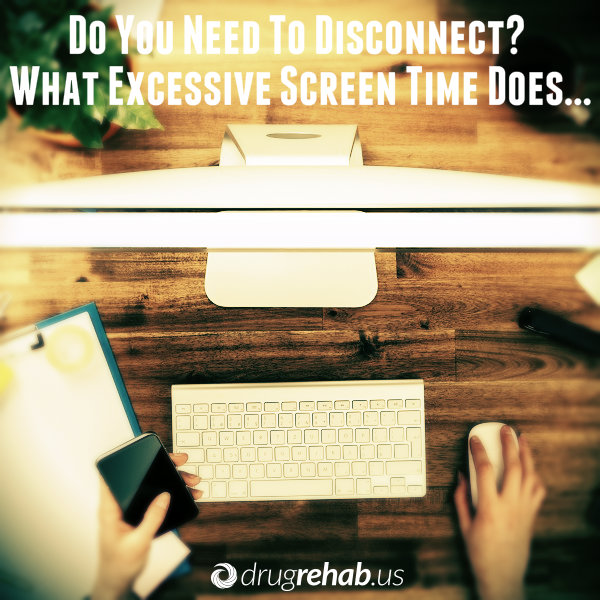 The most basic finding from the research is that 90 percent of American adults have a cell phone, and 58 percent have a smartphone. In addition to many more mundane findings, the results strongly hint at a problem with excessive smartphone use.
The most basic finding from the research is that 90 percent of American adults have a cell phone, and 58 percent have a smartphone. In addition to many more mundane findings, the results strongly hint at a problem with excessive smartphone use.
In particular, the survey revealed that 44 percent of cell phone owners have slept with their phones next to their beds so that they wouldn’t miss calls, texts or other updates through the night. Over two-thirds of cell phone owners check for messages or updates even if their phones don’t ring, sound a tone or vibrate, and about three in 10 say they couldn’t imagine living without their phones.
Americans spend an average of seven hours and 24 minutes staring at screens each day, and for 8- to 10-year-old children, the average is eight hours. Teens spend the most time looking at screens on average, reaching a huge 11 hours per day.
An Overstimulated State
The increasing use of cell phones has many direct impacts, relating to both being connected and spending so much time looking at screens. Constant checking of your cell phone can make it harder to fall asleep, keeping your brain in an anxious, overstimulated state. This same effect occurs when messages you send aren’t responded to quickly—you find yourself checking your phone and possibly worrying that your message didn’t come across as intended. Research suggests that staring at screens makes people less creative and less productive.
There are also more obvious consequences of excessive cell phone use, in particular spending less time socializing with people in real life or engaging in hobbies. Even when people do socialize, it’s becoming increasingly common for a group of people to sit staring at their screens while ignoring the people around them.
Technology And Internet Use As Addictions
Internet addiction has yet to be officially acknowledged as a condition by the Diagnostic and Statistical Manual of Mental Disorders (the DSM), but most experts—who are seeing increasing numbers of people seeking help for technology and Internet addictions—accept its existence. It might seem counterintuitive that an addiction can persist without a substance, but addiction really comes down to the effect something has on the brain, and other behavioral addictions such as gambling addiction have gained widespread acceptance because of these addiction-like effects on the brain.
Looking at the definition of addiction in a broad sense also reveals the striking similarities with excessive Internet and technology use. Addictions of any kind are characterized by an inability to control how often you engage in an activity, feeling urges or cravings to engage in the activity and continuing with it despite negative consequences.
Internet and technology addicts run into problems with work and school when they’re unable to stop surfing the Internet or using their devices. They may also jeopardize relationships and suffer withdrawal-like symptoms when they’re disconnected.
The similarities are hard to deny, but there are still some problems with classifying technology or Internet use as an addiction. First, the Internet (and technology used to access it) often serves as a method to access other addictive media, like pornography, online casinos or video games, so it’s hard to pin down whether somebody is addicted to the Internet or something else that’s accessed online. Additionally, it’s difficult to define just how much use is too much.
These problems are more technical than anything, however. Real-world examples of people ruining their lives over excessive Internet or technology use and being unable to stop speak volumes about the problem. Clearly, something unusual is going on.
Disconnecting To Protect Against The Risk
Internet and technology addiction are almost certainly real conditions, and we need to take the risks seriously because the vast majority of Americans now use Internet-equipped devices. Although full-blown technology or Internet addiction won’t affect most of us (like most addictions won’t), taking steps to guard against overuse is a prudent move. Many experts recommend simply disconnecting for an hour each day, preferably before bed, but doing so any time throughout the day is beneficial. There are apps designed to help you limit the time you spend on your smartphone.
There are many similar approaches available that are suitable for less severe cases, and many more professional counseling or rehab programs if you’re struggling with a more serious addiction. As we continue to spend more and more time online, thinking about the extent of our use and its consequences is becoming increasingly important.
Read Our Other Intriguing Posts On Internet Addiction
04 May 2015
New App Aims To Tackle Smartphone Addiction
The debate surrounding smartphone addiction is in many ways a sign of our times, but it also raises crucial questions about how we define addiction.
Are we addicted simply because we use our Internet-equipped cell phones a lot? Anybody familiar with addiction knows that it isn’t as simple as this, so the argument that our growing use of the devices represents a widespread addiction—while not necessarily wrong—oversimplifies the situation.
However, when you consider other behavioral addictions such as gambling—including the impact they have on the brain—it’s clear that smartphone addiction is a real condition. So how do we reduce our smartphone addiction? In this age where there seems to be an app for everything, it was only a matter of time before we encountered something like Instant, a new app that aims to tackle smartphone addiction.
Smartphone Addiction 101
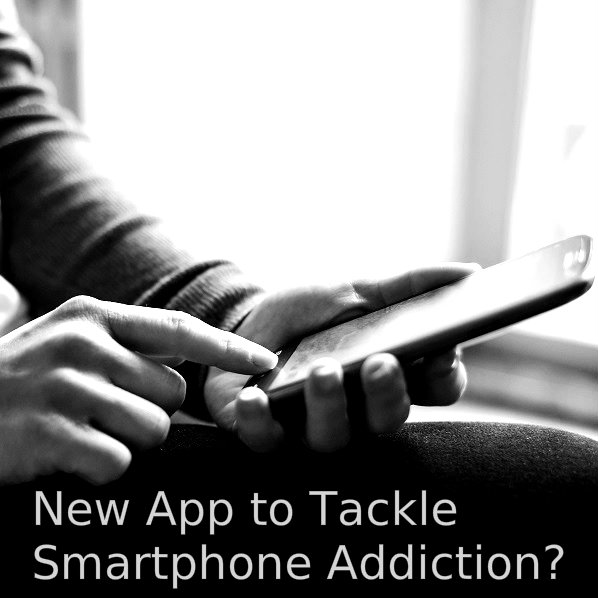 The definition of addiction is the key issue when discussing smartphone addiction, and despite the historical viewpoint that only substances could lead to addiction, behavioral addictions to things like gambling or sex have forced us to reexamine that way of looking at things.
The definition of addiction is the key issue when discussing smartphone addiction, and despite the historical viewpoint that only substances could lead to addiction, behavioral addictions to things like gambling or sex have forced us to reexamine that way of looking at things.
The reason relies on the neurochemistry of addiction: drugs are addictive because of the effect they have on natural brain chemicals such as dopamine. Other activities (like gambling or playing video games, for example) have a similar effect on these chemicals.
For smartphone addiction, it can also help to look at the situation in a more straightforward way. Addiction is characterized by tolerance (needing to do or take more of something to get the same effect), withdrawal (negative side effects when the substance or activity is stopped) and being unable to control the behavior despite negative consequences.
Signs Of Smartphone Addiction
Based on this, it’s clear that someone who has the following signs is potentially addicted to their phone:
- spends increasing amounts of time on his or her smartphone
- feels anxious or panicked when he or she is separated from it
- gets in trouble at work or school (or whose relationships suffer) due to smartphone use
Although only a small proportion of people are prone to full-blown addiction, as with alcohol, somebody who uses it too much could be considered a “problem” smartphone user.
Tracking Smartphone Usage In A Simple Format
Instant (available on Google Play for free and Blackberry World for 99 cents) is made by Indian startup Emberify and has fairly basic functionality. It records the number of times you unlock your phone and then keeps track of the amount of time the screen is left active. The accumulated data for each day is then displayed on a simple bar graph, making it easy to get the information you need at a glance. Other attempts at accomplishing the same thing, such as an app called Frequency, have focused on the time spent on specific apps, so Instant’s focus on overall smartphone-usage time makes it easier to digest what is effectively the same information.
According to company founder Shashwat Pradhan, “Instant works on the same principle of fitness trackers, with graphs and limit reminders.” The “limit reminders” basically allow you to set a limit on your daily usage and give you reminders of how much time you have remaining at user-designated intervals throughout the day. Pradhan has reduced his daily smartphone use from 120 to 50 minutes, which he attributes to an increased awareness of his usage habits.
New App, Instant Helps Problem Users, But What About True Addicts?
Instant is a promising development for more everyday users who’ve developed some problematic smartphone usage habits, but its stated goal of reducing smartphone addiction seems suspect. For a problem user, the regular reminders and daily limits indeed have the potential to promote awareness and thereby make it easier to say when enough is enough. This isn’t a trivial benefit—most people who use their smartphones too much will fall into this category, so it has the potential to avert growing issues for many of us.
The people Instant is highly unlikely to help are the addicts. To understand why, think about what the equivalent would be for substance users. It’s like saying to an alcoholic: you can drink five beers today, but no more, and I’ll give you reminders every few hours of how many drinks you’ve consumed. Would that defeat alcoholism? No! One of the hallmarks of addiction is attempting to limit yourself but being unable to do so. An alcoholic may have all the best intentions of drinking only five beers from a six pack, but the whole issue is that when that final beer is staring him or her in the face, best intentions are discarded and the remaining drink is cracked open.
Realistically, Instant is even more limited than the above example. For one, the limit is self-imposed, so individuals may not be strict enough in their goals. More importantly, the app is just that: a piece of software that you’re highly unlikely to feel like you have to answer to. You’ve gone over the limit? So what—nobody needs to know about it, and there is no punishment. Finally, as with all addictions, psychological support is a necessity to understand what drives the behavior and to teach the individual better ways to cope without it. Addicts struggle to get clean alone because addiction is a complex psychological issue that most people need professional support to effectively overcome.
Smartphone App Potentially Helpful, But Not For Everyone
There are many people whom Instant has the power to help, but sadly those who need it most will have inadequate support. Perhaps in the future, there will be a similar app incorporating psychological support with interactive lessons and coping tips that may actually help addicts. For now, Instant is a fantastic option for problematic smartphone users, but true addicts are still better off with traditional treatment approaches.
Find Out How Your Smartphone Obsession Is Bad For Your Health
You may be addicted to your smartphone, and if you are, your health is suffering. No, your phone is not a drug, but if you get anxious and panicky when you misplace it for two minutes or you check for new texts or Facebook updates every five seconds, you’re acting like an addict.
Sure, smartphones have made our lives easier and more convenient. They have even eliminated boredom from our daily existence, but at what cost?
Read on and you may decide to scale back your attachment to your favorite device.
Your Pocket Is Vibrating, Or Is It?
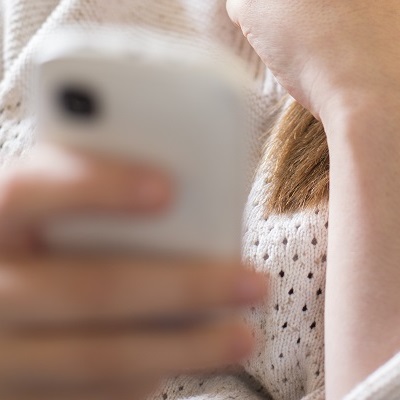 Phantom vibrations — when you think your phone just notified you of a message so you look at it and find nothing — are common among obsessed smartphone users. This phenomenon seems funny, but it’s a psychological disruption.
Phantom vibrations — when you think your phone just notified you of a message so you look at it and find nothing — are common among obsessed smartphone users. This phenomenon seems funny, but it’s a psychological disruption.
The next time you experience a phantom vibration, check your emotions. Did it make you feel anxious? Were you excited when you thought you had a new message or update, and were you disappointed to find you didn’t?
Did you then check your phone compulsively, sure that a notification was about to present itself? Anything that makes you feel this way is not healthy.
Your Smartphone Is Disrupting Your Sleep
Do you keep your phone on your bedside table? Do you scroll through it just before closing your eyes to sleep at night? Do you pick it up as soon as you wake up in the morning? While for safety and emergency purposes it seems justifiable to keep your phone next to your bed, your habits in using it are probably causing you to lose sleep. Studies have found that the type of light produced by your smartphone disrupts the production of hormones you need for good sleep. This means that it’s more difficult to fall asleep after screen time.
Another way your nighttime phone habit is interfering with your sleep is more psychological. You aren’t fully disconnecting from work and other preoccupations before you try to sleep at night. If you can’t detach, you will have trouble falling asleep, and your sleep may be disrupted because you are still thinking about work and other responsibilities. Stay away from the screen and turn off notifications two hours before bedtime to drastically improve your sleep and your energy levels during the day.
Your Smartphone Is Damaging Your Eyes
This is a scary one because it could have a lasting impact on so many people. The time you spend watching your phone’s screen is increasing your risk of eye damage. The bluish light from your smartphone that disrupts your sleep is also bad for your eyes. Exposure to it puts you at risk for macular degeneration, which is the most common cause of blindness. It is extended and frequent exposure to this light that causes damage, so if you cut back your time with the phone, you can cut out the risk.
Do You Have Nomophobia?
This modern problem is the fear of losing your phone: no-mobile-phone-phobia. According to a survey conducted by a British tech company, nomophobia is on the rise. Out of 1,000 people surveyed, two-thirds were seriously afraid of losing their phones. Nearly half keep two phones because of this fear, and young people are the most nomophobic. If you feel anxious and break into a cold sweat just thinking about misplacing your phone, you probably have nomophobia.
Tips For Those Struggling With Smartphone Obsession
Smartphone addiction is a serious problem for more and more people. To make sure that you aren’t suffering because of your phone use, cut back on your screen time. Stop using your phone before bed and refrain from touching it in the morning, at least until you are up and making coffee. Take breaks from it throughout the day and even consider taking one whole day each week away from your phone. It will be hard at first, but you won’t regret cutting back.
Learn More About Other Behavioral Addictions
Our lives today have become inextricably entwined with electronic devices. For many reasons, our cell phones, tablets and other devices have helped us. They allow us to connect more easily with others, to work on the go or work at home, and to access more information. There are downsides too. Becoming addicted to using your devices is a real possibility. We can become so dependent on them that it gets difficult to put them down or to turn them off.
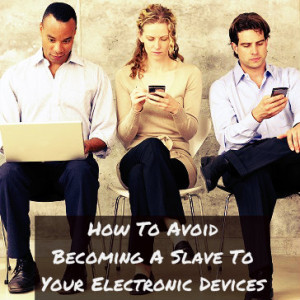 According to studies, being addicted to your cell phone is similar to other impulse control disorders, like compulsive shopping. All activities linked to our phones can lead us to use them obsessively. This includes texting, surfing the Internet, emailing and playing games. Using devices can start to take over your life, but if you are aware of the issue and your own usage, you can prevent it
According to studies, being addicted to your cell phone is similar to other impulse control disorders, like compulsive shopping. All activities linked to our phones can lead us to use them obsessively. This includes texting, surfing the Internet, emailing and playing games. Using devices can start to take over your life, but if you are aware of the issue and your own usage, you can prevent it
On reading this, you may feel immediately defensive. Maybe you don’t think you use your devices to an excessive degree. Find out just how much you are on them by keeping a log. Keep a notebook handy or a note writing app on your Smartphone, and record the time you spend doing anything on your phone, tablet or computer that is not directly related to work or actual phone calls. You may just be surprised by how much time you are texting, checking Facebook updates and Tweets, or checking on emails. Imagine what else you could do with all that time.
Can You Limit Device Use In Certain Situations?
A major irritant of modern life is when people use their phones in inappropriate situations. Checking your texts at dinner, at the movies or when in the middle of a conversation with a real, live person is inconsiderate. If you struggle to turn away from your phone in these situations, you could have a problem. Set a goal for yourself of resisting those urges. When you are with a friend or your family, tell them that you are trying to limit yourself and encourage them to call you out when you slip up. Their support will help you.
Can You Unplug For An Hour?
Test the extent of your devotion to your devices by trying to leave them alone for just one hour when you’re alone and have no one to distract you. Turn off your phone, put your tablet in a drawer, turn off your computer, and walk away. Pick up a book or magazine, bake something, watch a movie, or do anything else for an hour and see how it feels.
If you are disturbed by constant urges to check your texts, your emails, or your social media pages, you may have the beginnings of a device addiction. If you can get past those urges, however, and spend the hour avoiding your devices, it will make a difference. Try to do this once a day, and even twice a day to get some space between you and your gadgets.
Device addiction in all its forms—Internet, gaming, texting—is a real thing. You can become too attached to your gadgets and what they represent: connection. It’s OK, and even healthy, to disconnect for periods of time. Unplug and do something else and you may just find that you had been neglecting other hobbies and activities you enjoy. You may also find that you were failing to connect with people in the real world. As long as you are aware and make a point to limit yourself, you can avoid the dreaded device addiction.
Read More About Internet Risks And Addictions
Addiction is a tricky illness, especially when it comes to behavioral addictions. Chemical addictions are straightforward. A substance—alcohol or drugs—makes chemical changes to your brain and makes it difficult for you to stop using. Clear signs of dependence emerge, such as withdrawal symptoms and tolerance. But, where do you draw the line when it feels like you might be obsessively engaging in an activity? Are you addicted? And if so, how do you stop?
What Is Social Media Addiction?
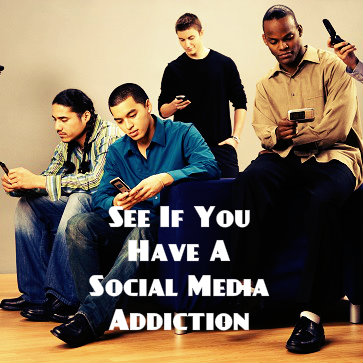 Being addicted to social media is not a condition recognized officially by the medical and addiction communities. However, there is a whole class of recognized addictive disorders called behavioral or process addictions. These refer to the compulsive and obsessive need to engage in a particular activity or behavior. It could be gambling, having sex, shopping, eating or even using social media.
Being addicted to social media is not a condition recognized officially by the medical and addiction communities. However, there is a whole class of recognized addictive disorders called behavioral or process addictions. These refer to the compulsive and obsessive need to engage in a particular activity or behavior. It could be gambling, having sex, shopping, eating or even using social media.
In our hyper-connected world in which we are all glued to devices, becoming obsessive about using them is not unusual. Social media sites like Facebook, Twitter, and Instagram allow us to keep in touch with other people, but when you keep turning to them with a burning compulsion, you may be developing a problem.
How Can I Tell If I Have A Problem With Social Media?
The line between responsible, normal use of social media and addictive use can be tricky to distinguish. It is especially difficult to see that line in your own use; it is easier to see it in others. For this reason, one sure sign that you need to rethink your usage is if someone points out your obsession. If a concerned loved one tells you that you may be turning to Facebook too often, you should listen and resist the urge to become defensive.
Another clear sign of a behavioral addiction is if you engage in the activity to feel better. If you get an emotional high or a feeling of stress relief from using social media, you are becoming dependent on it. Another sign is the experience of withdrawal. Withdrawal symptoms in chemical addictions are clear-cut and to be expected, but you can also experience them with behavioral addictions. Take notice if you feel anxious, depressed, or antsy when you can’t get to your phone or tablet to update your status.
If you find that your compulsive attachment to social media interferes with other aspects of your life, you need to reevaluate your usage. Maybe you are getting in trouble at work because you can’t stay off your favorite sites and you don’t get your work done. Maybe your relationships within your family are deteriorating because you spend too much time online. These are signs that you have a problem. Finally, if you recognize that you are online too often, try to cut back and find that you can’t, you may be addicted.
How Can I Get Help For Social Media Addiction?
As with any addiction, professional help and support of loved ones are the keys to recovery. As more people face the problem of overusing technology, more professionals are available to help you cope and come clean. Find a therapist or counselor who has experience working with people who have behavioral addictions. Also consider finding a support group that can help you deal with your problem by relating to others in the same situation. Enlist the support of your loved ones to help you get through this, and you will be successful.
Read More About Why Internet Addicts Are More Likely To Abuse Drugs And Alcohol


